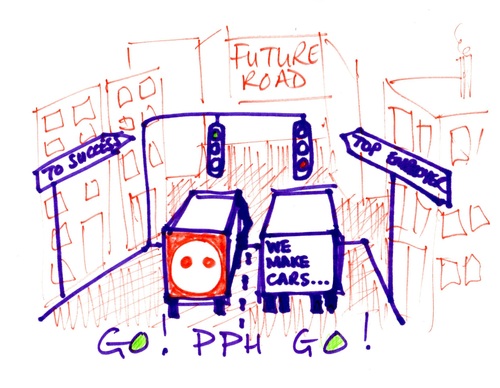
What I find most remarkable about what we do at PeoplePerHour is giving people real access. That what the internet does through and through one would argue, and its true, but think about the impact of that for a tiny business just starting off
Because of the internet and innovations like PeoplePerHour, a one man band just starting off now has access to a workforce of near 325,000 business. Just a mouse click away
To put this into perspective that’s 2k less than Ford Motor company, a company founded in 1903 and has – amongst other achievements – commercialized the car! No small feat by any measure of the imagination J
Or seen otherwise – that’s 15k more than Tesco: the largest retailer in the UK with an annual turnover over £40bn!
Isn’t that truly amazing? How a company of the size of 1 can have more people readily available to work for it, from Day 1. Think of what Tesco had to go through to get there!:)
That’s what’s truly transformational and disruptive about what we do and why we have full conviction that we are at the beginning of a new era for business, for entrepreneurs and for talent the world over.
Marketplaces are remarkable entities. As they growth they develop a mind of their own. Like an ant colony. They develop their own behavior and set of rules. And as they grow the entrepreneur has less and less power to giver it.
But fundamentally what drives marketplaces is their failure to do what is their exact purpose: to create a ‘match’ between the two parties, supply and demand. It’s their imbalance that drives them and creates the rules of engagement.
Am architects of a marketplace has 3 main levers to pull; and these main levers are all aimed at constantly trying to rebalance and imbalanced marketplace. That’s the name of the game.
By skillfully maneuvering these three, and the many moving parts within each of them, a successful marketplace emerges and grows. And as it grows the network effects get stronger until at some point it overtakes the architect’s power to do very much.
Here I analyse these three levers and I draw on one very interesting analogy which – though seemingly wacky – has a lot of truth in it and has always fascinated me. The behaviour of marketplaces has stark similarities to dating. Why dating as an analogy? There’s probably more analogies to be made to surface the power of these 3 levers, economic policy making is another. But far more people relate to dating than policy making. Plus its far more interesting Jcontinue reading »